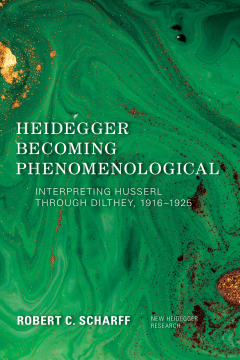
Additional Information
Book Details
Abstract
In this first book-length study of the topic, Robert C. Scharff offers a detailed analysis of the young Heidegger’s interpretation of Dilthey’s hermeneutics of historical life and Husserl’s transcendental phenomenology. He argues that it is Heidegger’s prior reading of Dilthey that grounds his critical appropriation of Husserl’s phenomenology. He shows that in Heidegger’s early lecture courses, a “possible” phenomenology is presented as a genuine alternative with the modern philosophies of consciousness to which Husserl’s “actual” phenomenology is still too closely tied. All of these philosophies tend to overestimate the degree to which we can achieve intellectual independence from our surroundings and inheritance. In response, Heidegger explains why becoming phenomenological is always a possibility; but being a phenomenologist is not. Scharff concludes that this discussion of the young Heidegger, Husserl, and Dilthey leads to the question of our own current need for a phenomenological philosophy—that is, for a philosophy that avoids technique-happiness, that at least sometimes thinks with a self-awareness that takes no theoretical distance from life, and that speaks in a language that is “not yet” selectively representational.
No one knows the Heidegger-Dilthey connection better than Robert Scharff, and in this revolutionary new work he pushes the reset button on the origins of Being and Time. Through a meticulous reading of the earliest courses Scharff reveals how Heidegger’s grappling with Dilthey turned him into a phenomenologist of life and eventually of Dasein, in contrast to the transcendental consciousness of Husserl. Written with clarity and verve, this book leaves the “Seinology” of later commentaries in the dust and restores to Heidegger’s work the existential vitality that is its birthright.
Thomas Sheehan, Professor of Religious Studies, Stanford University
As Scharff sees it, Heidegger's way of becoming phenomenological was not Husserl's, who regarded phenomenology as a theoretical-scientific attitude of a transcendental subject expositing its intentional objects, but rather Dilthey's, who situates it in the whole of life that is always already there as an articulated historical context that mutually correlates self and world into a meaningful whole.
Theodore Kisiel, Distinguished Research Professor Emeritus of Philosophy, Northern Illinois University
Robert C. Scharff is Professor of Philosophy Emeritus at the University of New Hampshire and Executive Director of ITERATA, a non-profit institute for the study of interdisciplinarity in science, industry, and higher education. He is author of How History Matters to Philosophy (2015), Comte After Positivism (2002), and numerous papers on 19th and 20th century positivism, postpositivism, and continental philosophy; co-editor (with Val Dusek) of The Philosophy of Technology (2003, 2014); and former editor of Continental Philosophy Review (1994–2005).
Table of Contents
| Section Title | Page | Action | Price |
|---|---|---|---|
| Cover | Cover | ||
| Half Title | i | ||
| Series Information | ii | ||
| Title Page | iii | ||
| Copyright Page | iv | ||
| Contents | v | ||
| Acknowledgments | vii | ||
| Notes on Frequent Citations | xi | ||
| Preface | xiii | ||
| 1 Introduction—Preparing to “Be” Phenomenological | 1 | ||
| Heidegger’s “Preliminary” Question | 2 | ||
| Destructively Retrieving Husserl | 4 | ||
| Destructively Retrieving Dilthey | 7 | ||
| Retrieving Dilthey for Our Sake | 12 | ||
| Part One | 21 | ||
| 2 From Dilthey to Heidegger: Recasting the Erklären-Verstehen Debate | 23 | ||
| TwoKinds of Science? What Is at Stake | 24 | ||
| Dilthey’sExperience-Based Defense of Verstehen | 27 | ||
| Diltheyon the Standpoint of Life | 31 | ||
| Husserl’sPhenomenological Replacement of Dilthey’s Standpoint | 36 | ||
| 3 Heidegger’s Destructive Retrieval of Dilthey’s “Standpoint of Life” | 49 | ||
| OnPhenomenology: Dilthey before Husserl | 50 | ||
| AppropriatingDiltheyan “Intuitions” | 57 | ||
| AppropriatingWhat Is Formally Indicated | 62 | ||
| Whereand How Appropriation Ends | 69 | ||
| Part Two | 85 | ||
| 4 From Dilthey to Husserl | 87 | ||
| “Genuine”Phenomenology | 88 | ||
| “Ambiguity”in Husserl’s Writings | 89 | ||
| Husserl’s“Theoretical” Defense of Phenomenology | 91 | ||
| Husserl’sOpposition to Naturalism and Historicism | 96 | ||
| Phenomenology’sSpecial Version of Philosophy’s “Problem of Method” | 99 | ||
| 5 Heidegger’s Diltheyian Retrieval of Husserl’s Two Sides | 111 | ||
| The“Rigor” of Genuine Phenomenology | 111 | ||
| Turntoward Rigor or Return to Life | 115 | ||
| Bracketingversus “Rejoining” Lifeworld Experience | 119 | ||
| Natorp’s“Subjectification” of Erlebnis | 122 | ||
| ReadingNatorp through Dilthey | 126 | ||
| FromDilthey to Achieving Phenomenology’s “Basic Attitude” | 129 | ||
| SustainingPhenomenology’s Basic Attitude | 133 | ||
| 6 Conclusion—Continuously “Becoming” Phenomenological | 147 | ||
| GivingDilthey His Due | 149 | ||
| BecomingPhenomenological, Never Being Phenomenological | 153 | ||
| Phenomenology,Not Just Phenomenological Scholarship | 157 | ||
| References | 165 | ||
| Index | 177 |
